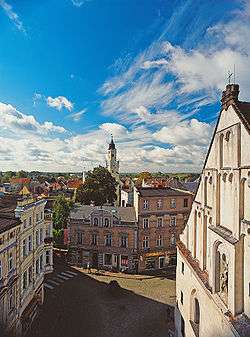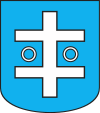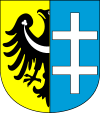Wschowa
| Wschowa | |||
|---|---|---|---|
|
View from Protestant church to town hall | |||
| |||
 Wschowa | |||
| Coordinates: 51°48′N 16°18′E / 51.800°N 16.300°E | |||
| Country |
| ||
| Voivodeship | Lubusz | ||
| County | Wschowa County | ||
| Gmina | Gmina Wschowa | ||
| Government | |||
| • Mayor | Danuta Patalas | ||
| Area | |||
| • Total | 8.38 km2 (3.24 sq mi) | ||
| Population (2006) | |||
| • Total | 14,573 | ||
| • Density | 1,700/km2 (4,500/sq mi) | ||
| Time zone | CET (UTC+1) | ||
| • Summer (DST) | CEST (UTC+2) | ||
| Postal code | 67-400 | ||
| Car plates | FWS | ||
| Climate | Dfb | ||
| Website | http://www.wschowa.pl | ||
Wschowa [ˈfsxɔva] (German: Fraustadt) is a town in the Lubusz Voivodeship in Poland with 14,607 inhabitants (2004). It is the capital of Wschowa County.
History
Wschowa was originally a border fortress in a region disputed by the Polish dukes of Silesia and Greater Poland. After German colonists had established a settlement nearby, it received Magdeburg rights around 1250. The Old Polish name Veschow was first mentioned in 1248, while the Middle High German name Frowenstat Civitas first appeared in 1290. After the Silesian Piast dukes had gradually accepted Bohemian suzerainty, King Casimir III the Great in 1343 finally conquered it for Poland. The ziemia Wschowa then was incorporated into the Greater Polish Poznań Voivodeship of the Polish Crown.
Wschowa and its Latin school was one of the centres of the Protestant Reformation in Poland and a retreat for religious refugees in the days of the Counter-Reformation in adjacent Habsburg Silesia.
The Battle of Fraustadt occurred on February 3, 1706 during the Great Northern War, when Swedish forces defeated a joint army of the Polish–Lithuanian Commonwealth, Saxony and Russia. Within the Second Partition of Poland in 1793, the region was annexed by the Kingdom of Prussia and incorporated into the province of South Prussia, until in 1807 it was awarded to the Duchy of Warsaw according to the Treaty of Tilsit.
Jakob Walter, a Napoleonic soldier claimed to have passed through the town in 1806. He claims the town was used as a garrison and had 99 windmills.[1]
A part of the Grand Duchy of Posen from 1815 on, the town was again incorporated into the Prussian Province of Posen in 1848. According to the 1919 Treaty of Versailles, Fraustadt remained part of Weimar Germany and formed the southernmost district of the Posen-West Prussia border province till 1 October 1938, when the province was dissolved. It became a district center in the Province of Silesia till 1941, from 1941 to 1945 in the Province of Lower Silesia. Fraustadt was one of the few areas within Germany attacked by the Polish military during the Invasion of Poland in 1939. For a few hours its neighboring town of Geyersdorf (now Dębowa Łęka) was the first German town to be occupied by enemy forces in the war. Fraustadt was occupied by Red Army on 1 February 1945. Since 1945 the area as a result of the Potsdam Conference belongs to Poland. The region was ethnically cleansed, the native German populace was expelled and replaced by Poles.
Initially the town was part of Okreg III (compromising present West Pomeranian and Lubusz provinces) between 1945 and 1946, laterly a county (powiat) center in Poznan Voivodeship between 1946 and 1950 and later in Zielona Gora Voivodeship between 1950 and 1975. It was finally a commune (gmina) center in Leszno Voivodeship between 1975 and 1999 before creation of Lubusz province. It became again a country center after 24 years.
Famous people
- Valerius Herberger (1562–1627), Lutheran theologian
- Melchior Teschner (1584–1635), German cantor, composer and theologian
- Samuel Friedrich Lauterbach (1662–1728), Lutheran theologian and historian
- Andreas Gryphius (1616–1664), Baroque poet, lived at Fraustadt on and off
- Christian Gryphius (1649–1706), son, dramatist, was born here
- Johannes Heinrich Valerius Graf (1837-1917), German painter
- Bronisław Geremek (1932–2008), historian and politician, attended school at Wschowa
- Waldy Dzikowski, politician, born 1959 at Wschowa
Sport
Wschowa hosted the 2010 edition of the Polish Sidecarcross Grand Prix.[2]
International relations
Twin towns — Sister cities
Wschowa is twinned with:
 Šalčininkai, Lithuania
Šalčininkai, Lithuania
References
- ↑ The Diary of a Napoleonic Foot Soldier by Jakob Walter
- ↑ FIM Sidecarcross World Championship - 2010 Calendar FIM website, accessed: 30 October 2009
External links
| Wikimedia Commons has media related to Wschowa. |
- Fraustadt on Germania map of 1600
- Official town website
- Jewish Community in Wschowa on Virtual Shtetl
Coordinates: 51°48′N 16°19′E / 51.800°N 16.317°E



